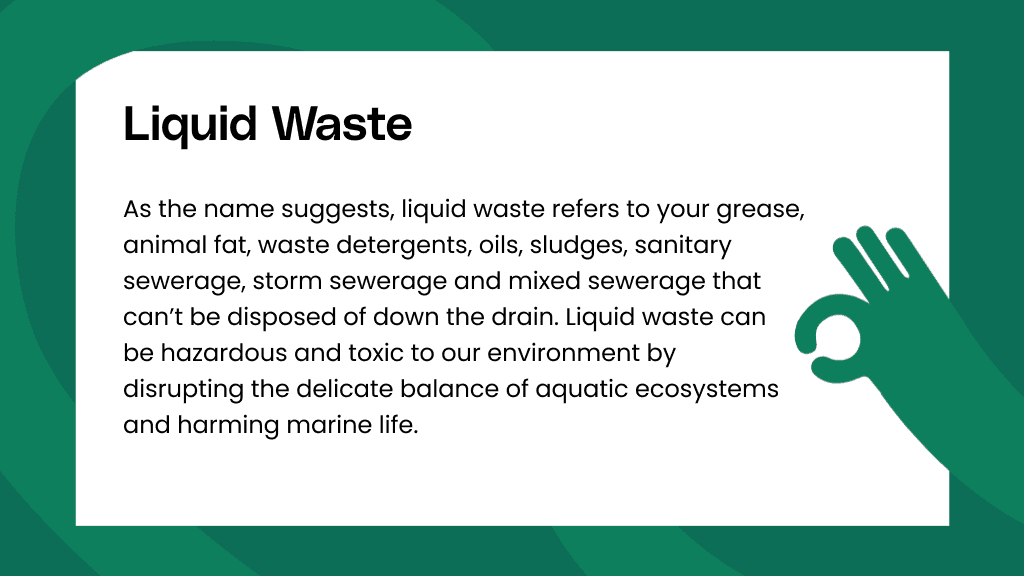6 Simple Techniques For Reclaim Waste
6 Simple Techniques For Reclaim Waste
Blog Article
Reclaim Waste Fundamentals Explained
Table of ContentsThe Of Reclaim WasteAbout Reclaim WasteThe Best Guide To Reclaim WasteThe Definitive Guide to Reclaim WasteReclaim Waste Things To Know Before You Buy
Check out the types, events, and types of liquid waste. Residential sewage waste refers to the waste and items from a household septic container. This kind of waste is created by human beings in homes, colleges, and various other buildings. This only consists of septic systems that have a drainpipe field. The correct administration and disposal of residential sewage waste call for liquid waste to be moved to a sewage therapy plant where the proper methods and tools are applied to purify and deal with waste.
Business waste typically consists of potential hazards, such as combustible materials or a combination of liquid and solid waste items, and calls for an advanced and in-depth disposal procedure. The disposal of business waste generally includes the purification of waste prior to transport to ensure risk-free and appropriate disposal. Hazardous waste is developed from results and runoff of industrial processes and production.
This type of waste can not utilize the very same sewer monitoring transport or processes as septic or commercial liquids. The hazardous waste administration process calls for the evaluation and testing of liquid waste before it goes through the disposal process (liquid waste disposal). Drainage waste is the fluid waste that originates from overflow and excess stormwater in extremely inhabited areas or cities
Runoff waste can cause contamination and flooding if not dealt with properly. Find out more about sewage system cleansing and waste monitoring. Making certain appropriate waste monitoring can prevent calamities and lower ecological damage. Both individuals in household setups and experts in industrial or production sectors can gain from comprehending the processes and regulations of fluid waste administration.
The Reclaim Waste Diaries
Contact PROS Providers today to learn concerning our waste management and disposal solutions and the proper methods to look after the liquid waste you create.
(https://reclaimwaste1.mystrikingly.com/blog/efficient-liquid-waste-disposal-in-melbourne-why-reclaim-waste-is-your-go-to)Do you know what takes place to your water when you end, flush the bathroom or drain pipes the washing maker? No? Well, it deserves knowing. This supposed 'wastewater' is not just an important source but, after therapy, will be released to our land, waterways or the sea. Utilized water from toilets, showers, baths, kitchen sinks, laundries and commercial processes is recognized as wastewater.

water made use of to cool down equipment or clean plant and tools). Stormwater, a form of wastewater, is overflow that streams from farming and city locations such as roofing systems, parks, yards, roadways, courses and seamless gutters right into stormwater drains, after rainfall. Stormwater streams untreated directly to regional creeks or rivers, ultimately reaching the sea.
An Unbiased View of Reclaim Waste
In Queensland, most wastewater is treated at sewage therapy plants. Wastewater is moved from domestic or industrial sites with a system of drains and pump stations, called sewage reticulation, to a sewer therapy plant. Regional federal governments construct, maintain and run most sewage therapy plants. Operators are certified under the Environmental Management Act 1994 to discharge treated wastewater at an acceptable ecological criterion into rivers.
The Division of Natural Resources recommends local governments about handling, operating and preserving sewerage systems and therapy plants. In unsewered areas, local governments might require homeowners to mount individual or home sewer therapy systems to treat residential wastewater from commodes, kitchen areas, bathrooms and washings. The Division of Natural Resources authorizes using home systems when they are shown to be effective.
The majority of stormwater obtains no therapy. In some brand-new neighborhoods, treatment of some stormwater to get rid of litter, sand and gravel has actually started using gross toxin catches. Wastewater treatment occurs go to this website in 4 stages: Removes solid issue. Bigger solids, such as plastics and other things incorrectly discharged to sewage systems, are removed when wastewater is gone through displays.
Makes use of tiny living microorganisms knows as micro-organisms to break down and get rid of continuing to be dissolved wastes and fine fragments. Micro-organisms and wastes are included in the sludge.
Get This Report about Reclaim Waste
Nutrient removal is not readily available at all sewer therapy plants due to the fact that it calls for costly specialist equipment. Clear liquid effluent generated after therapy might still have disease-causing micro-organisms - liquid waste disposal.

Many wastewater flows right into the sewerage system. Under the Act, neighborhood federal governments administer authorizations and licences for eco appropriate tasks (Periods) including wastewater launches that may have a neighborhood influence.
Top Guidelines Of Reclaim Waste
Otherwise, samples are considered research laboratory analysis. Commonly many tests are needed to develop the levels of each of the different contaminants such as oils, hefty steels and chemicals in water. Monitoring offers accurate info concerning water quality and can confirm that licence conditions are being satisfied. The info acquired via surveillance provides the basis for making water quality decisions.
Report this page